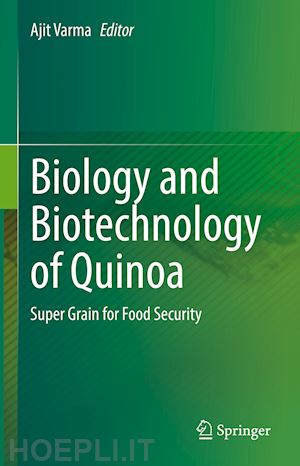
Questo prodotto usufruisce delle SPEDIZIONI GRATIS
selezionando l'opzione Corriere Veloce in fase di ordine.
Pagabile anche con Carta della cultura giovani e del merito, 18App Bonus Cultura e Carta del Docente
This book is designed to popularize Quinoa cereal among both scientific and food industry. Quinoa is an attractive candidate for protein replacement, has potential for futuristic biotechnological modifications, and is able to grow under many different abiotic stresses. To save the world from animal cruelty, quinoa emerges as a hero for vegans and vegetarians.
This book deals with morphological features, life cycle, nutritional qualities, genetics, agronomic manipulations, ecological communications, stress tolerance mechanisms, and food applications of Chenopodium quinoa.
Quinoa is a pseudo-cereal native to Andes Region in South America. Over time, it spread to many different regions worldwide and is emerging as protein-rich vegetarian food source. In order to cure malnutrition globally, it is important to channel this lesser-known grain to local cultivators. This can only be done through well-proven scientific data that supports its qualities. This book aims todo the same, while also giving an insight into the vast scope quinoa posses as an experimental crop. Its stress-tolerant abilities can inspire scientists to understand those mechanisms, further exploit them, and even introduce them into other stress-sensitive crops. In future, quinoa can be among the top sources that offer food security. Due to its adaptability, ease of cultivation, and rich output, sustainability can be achieved by regulating its breeding and growth.This book is of interest to researchers, teachers, agronomic cultivators, environmentalists, botanists, microbiologists, geneticists and food technologists. This book covers recent advances, challenges in cultivation, biology, nutrition, and agricultural science topics, suitable for both young learners and advanced scientists. Cultivators who want to know more about quinoa and introduce it into their agronomic applications will find helpful information from the text.
Prof. Dr. Ajit Varma is currently the Group Dy. Vice-Chancellor, Amity Institute of Microbial Technology & Vice-Chairman, Amity Science, Technology & Innovation Noida, Uttar Pradesh, India.
He was a visiting professor to many Universities such as Friedrich Schiller University, Max Planck (Germany), etc. Received several awards such as Commonwealth Fellowship, Alexander von-Humboldt Fellowship, DAAD Fellowship, etc. Lifetime achievement award, by Former President, Dr. Pratibha Patil (2018).
He has successfully supervised over 111 PhDs students.. He has published over 500 research articles, 125 books in the area of Microbial Technology, published Springer-Verlag, Germany etc.











Il sito utilizza cookie ed altri strumenti di tracciamento che raccolgono informazioni dal dispositivo dell’utente. Oltre ai cookie tecnici ed analitici aggregati, strettamente necessari per il funzionamento di questo sito web, previo consenso dell’utente possono essere installati cookie di profilazione e marketing e cookie dei social media. Cliccando su “Accetto tutti i cookie” saranno attivate tutte le categorie di cookie. Per accettare solo deterninate categorie di cookie, cliccare invece su “Impostazioni cookie”. Chiudendo il banner o continuando a navigare saranno installati solo cookie tecnici. Per maggiori dettagli, consultare la Cookie Policy.